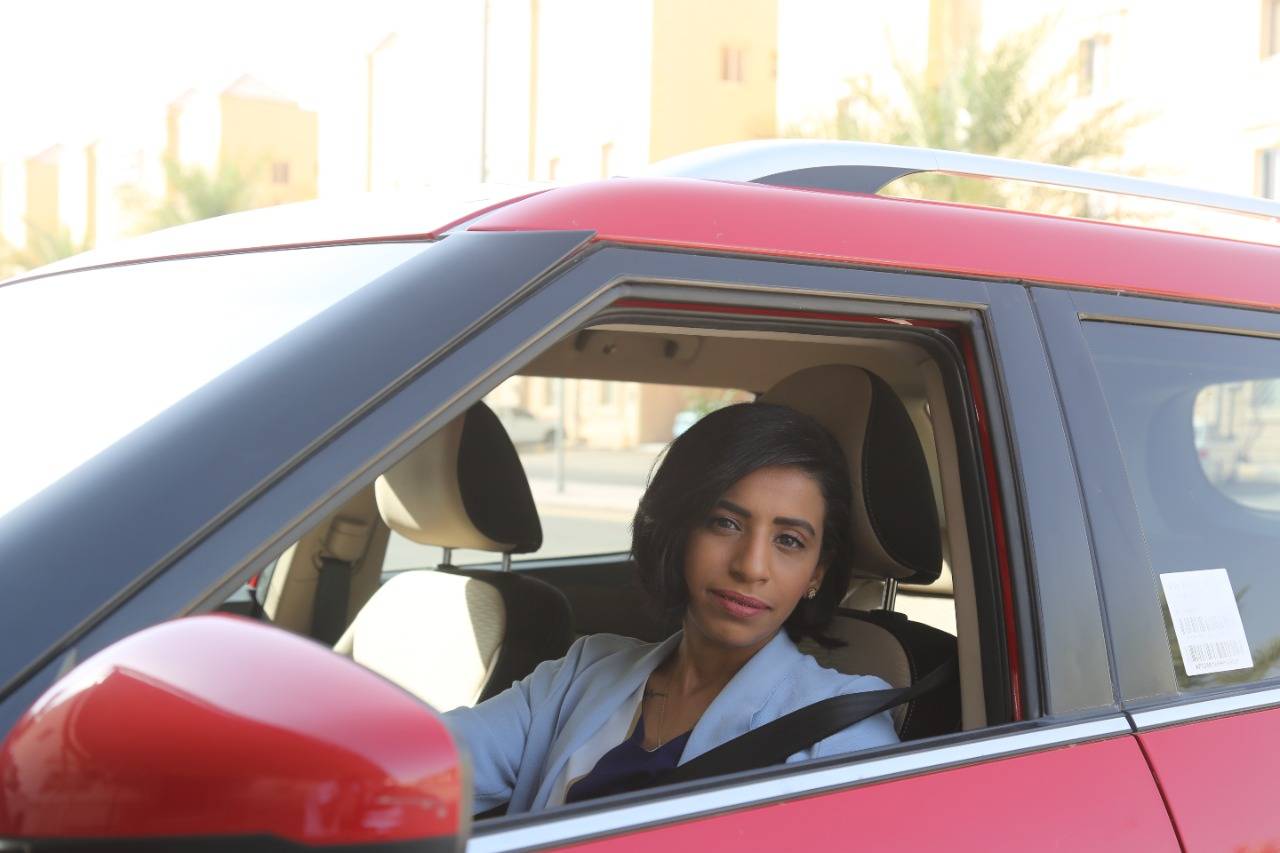“The whole thing was actually a dare between me and a friend of mine. She couldn’t believe I would do it, and thought it was all just a joke, but I did it.” With this phrase, Widad Abdallah, one of the first women to drive a taxi in Saudi Arabia, began talking about her unprecedented experience in a country that has been undergoing change in its conservative society in recent years.
While speaking with Raseef22, the young woman, who is only 31 years old, said that she was mostly expecting shock and dismay from men in a purely male-dominated society that forbade women from not only driving, but also from going out alone, in addition to not wearing the hijab in public places. “But I actually found myself shocked by some girls of my own gender. There were men who were supportive of me, telling me that they were proud of the women of their country who are working hard. And this in itself came as another shock, but it was a positive one that pushed me to hold on to my second job.”
Today, Widad is no longer the only one who practices this profession, which has been held exclusively by men throughout the history of the Arab kingdom, specifically within the Asian communities working there. However we can say that she is one of the pioneers in this field, and her clients are of both genders, while her fellow colleagues who began working in the same field nearly a year after she did, specialize more in transporting female clients.
In reality, there is no official number for the female taxi drivers in Saudi Arabia, but according to Widad, it can be counted on the fingers of one hand.

I really love this job
When Widad decided to enter into the taxi business, she was not looking for a job, and wasn’t going through any financial hardship. After getting a Bachelor’s degree in Childhood studies from the King Abdulaziz University (KAU), she was offered several job opportunities, including supervising the canteens department in a school in the city of Jizan in the far southwest of the Kingdom. She also later worked as the head of a department in an educational institution in Riyadh.
“The idea came to me as a sort of a challenge and an adventure. Some colleagues assumed that it was just a temporary idea I had in a moment of madness. Even my parents thought I was joking, but after they saw my taxi driver’s license, they realized that I was serious, and they have currently accepted it. The same happened with my colleagues and managers where I work, and they now praise me and say that I’m a responsible person who’s investing my time in securing my future.”
At the beginning of her journey, Widad registered in the ‘Mowajih’ mobile application for taxis, before moving on to apps like ‘Careem’, ‘Uber’, and others. “I work using all these apps, and wherever the request comes from, I take it.”
In late 2019, Widad quit her first job to move to a large hospital in Riyadh, where she currently runs an administrative department. After she finishes her shift, she gets into her car and starts her second job. “I work about sixteen hours a day, eight hours in the hospital, and another eight in the taxi,” she says, adding that she is thinking of moving after some time to work in the social media field, while keeping the taxi profession that she loves so much.
Some people might ask this question: Why would a girl who has a good job and holds a university degree resign from her position to drive a taxi alongside another job? Widad answers: “My work with taxi apps provides me with a good income, as I earn about 500 Saudi riyals per day (about $130), in addition to the fact that this type of work guarantees me independence when it comes to working hours, without the restrictions that one would find in a traditional job.”
Friendships and new opportunities
Following her experience which has been going on for three years so far, Widad says, “Personally, I did not encounter any problems in this profession, and if I did, I would have left it a long time ago. On the contrary, it provided me with a good income, courage, and self-confidence, and don’t forget that we used to be in a society where a woman could not talk to her own brother in the street if she ran into him. Today my clients include men as well, I talk to them, and they often request my services again. This job has made me some friendships with a number of clients, including some who have helped me work in companies as a content creator, a job that I will soon move on to.”

In this regard, Widad advises girls in Saudi Arabia to “experiment” in order to decide on the profession they want to work in. “Do not judge these matters in advance, and do not hold on to appearances and what society might say. If you are in need of work, and you have the courage and patience, just try. However our profession requires a great deal of patience, since we deal with many different types of people, and every hour we meet a new face.”
Do you trust all the customers who ride with you? Are you not afraid of some of them? These are all logical and legitimate questions for a young woman working as a taxi driver in an Arab country. Widad answers, “I have never experienced any harassment before, especially from men, and I also work with a group of online applications, and therefore the data of any customer is available for checking, and he/she can be tracked. But if I ever encounter a situation where someone is being rude or inappropriate, I do not continue the ride with the passenger. I’d just fearlessly kick him out of the car, and I could simply call the police. We are in a safe country, and I don’t think anyone would dare do something.”
But Widad speaks of harassment of a different kind. “In the initial period, I was a little irritable, and was quick to get angry at any sort of rude behavior. I used to kick some customers out of the car, because they tried to interfere in my personal life. Some of them complained that I do not wear a headscarf, and then they would engage in arguments and stories with me in a provocative manner, until I reached the breaking point and would ask them to leave. I could not understand what the connection was between my job and my hijab.”
The idea came to me as a sort of challenge and adventure. Some assumed it was just a whim. Even my parents thought I was joking, but after they saw my taxi driver’s license, they realized I was serious
At the same time, she was also on the receiving end of positive feedback from other clients. “I still remember that the sweetest compliments I received were from two children who were with their mother. That day one of them said to his mother: ‘Why don’t you learn to drive like her?’, then his younger brother intervened by saying: ‘She drives better than Baba does’. This testimony gave me positive energy and a great deal of support, since it came from two children, and kids do not usually compliment or flatter people.”
I forgot a passenger with me
Widad prefers the customer who talks and has a sense of humor. Communicating with the passenger is a good thing, especially if the trip is a somewhat long one. She has previously been in some funny situations, but none compare to the day when she forgot her “client”. How?
Widad recalls this story with a smile, “One time I had a client that I had been taking her to her home, and it so happened that the way to her house was the same route that leads to mine. On my way I forgot that she was with me because she was very quiet and does not talk like other clients do. I looked at the app and did not find any requests for transport, so I decided to close it and go home. When I happened to turn and look behind me, I noticed that the lady was still sitting in the back seat, thinking I was still on the correct route. I told her I got lost on the way, then turned back and took a new route to drop her off.”

Women claim their rights
Widad is optimistic about the status of Saudi women in the future, as she believes that she was able to establish her presence in under three years, and things still need time. “We are currently in a society where half has accepted this openness, and the other half has not yet grasped the situation, and this must be met with some understanding. However, current indications point to the idea that Saudi women are on the path towards advancement. In the past two years, we have been seeing college girls working in cafes, in malls, and as cashiers. There are waitresses in restaurants, and we have female champions within the world of sports. A year and a half ago saw the first Saudi young woman working in the field of car maintenance.”
Saudi women have broken the stereotype role of a child bearing women, and have also shattered the second stereotype, which states that she is only interested in shopping and travelling
Accordingly, Widad believes that the Saudi woman has broken the stereotype dictating that her role is only to get married and bear children, and she has also shattered the second stereotype within that stereotype, which states that she is a woman of luxury and only spends her time shopping and traveling, as many media outlets used to promote.
It is worth noting that Saudi women gained the right to drive in June 2018, after the Saudi monarch, King Salman bin Abdulaziz, issued a decision on September 26, 2017 allowing women to drive in accordance with proper religious and Sharia regulations. Today, a woman can drive without a headscarf on, even if she is with a man who isn’t related to her by blood. But before that date, a female caught driving a car would be fined and imprisoned.
During the past two years, the status of Saudi women has changed somewhat, even though she has not yet been granted all of her rights in full. In 2019, the Ministry of Justice allowed a girl or woman to get married without the consent of her legal guardian (parents) if she was over the age of 18. She also gained the right to open a bank account in her name without needing her ]guardian’s consent — something that was prohibited before 2018. The percentage of working women in Saudi Arabia has doubled in the last five years, and they also have the right to have independent passports as well as live and travel on their own.
Raseef22 is a not for profit entity. Our focus is on quality journalism. Every contribution to the NasRaseef membership goes directly towards journalism production. We stand independent, not accepting corporate sponsorships, sponsored content or political funding.
Support our mission to keep Raseef22 available to all readers by clicking here!
Interested in writing with us? Check our pitch process here!








Join the Conversation
ذوالفقار عباس -
3 hours agoا
Hossam Sami -
4 hours agoصعود "أحزاب اليمين" نتيجة طبيعية جداً لرفض البعض; وعددهم ليس بالقليل أبداً. لفكرة الإندماج بل...
Anonymous user -
1 day agoرائع و عظيم ..
جيسيكا ملو فالنتاين -
5 days agoزاوية الموضوع لطيفة وتستحق التفكير إلا أنك حجبت عن المرأة أدوارا مهمة تلعبها في العائلة والمجتمع...
Bosaina Sharba -
1 week agoحلو الAudio
شكرا لالكن
رومان حداد -
1 week agoالتحليل عميق، رغم بساطته، شفاف كروح وممتلء كعقل، سأشاهد الفيلم ولكن ما أخشاه أن يكون التحليل أعمق...